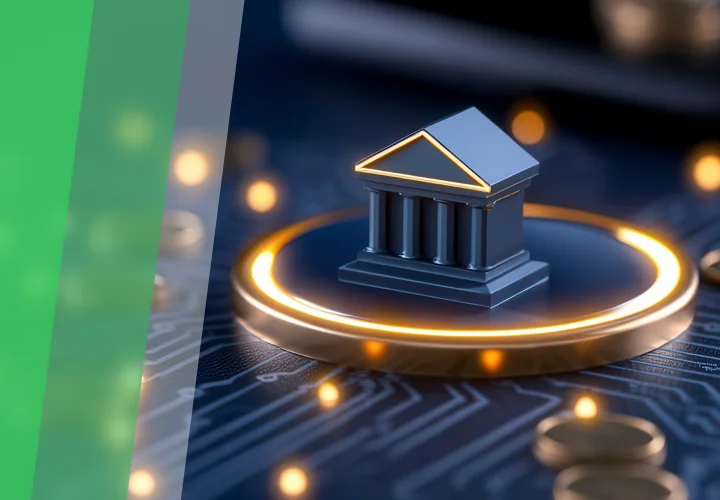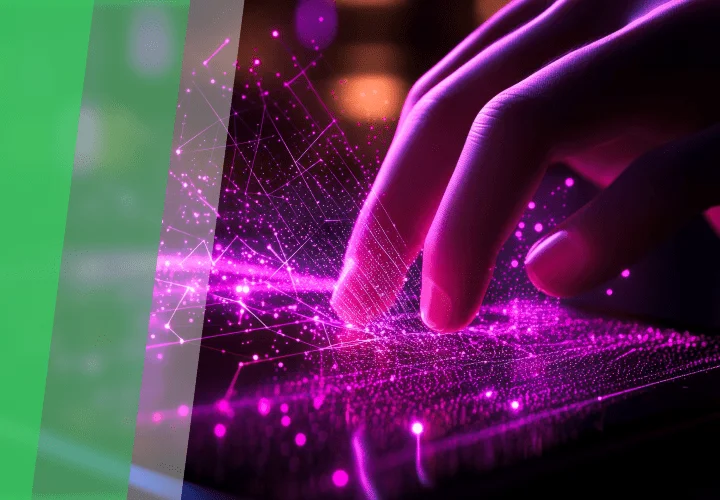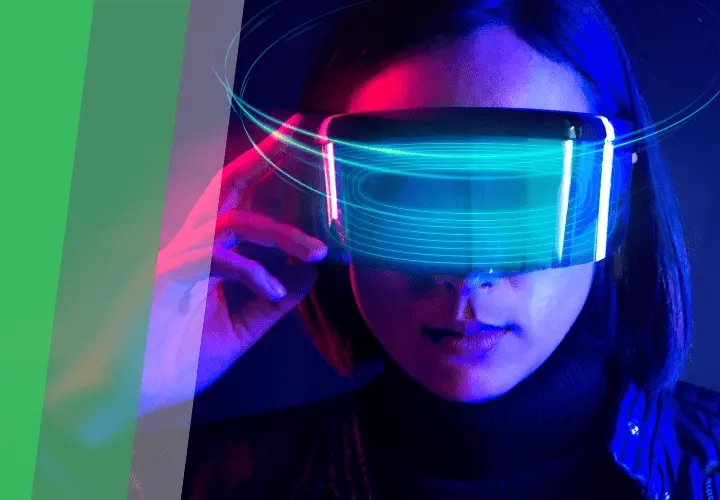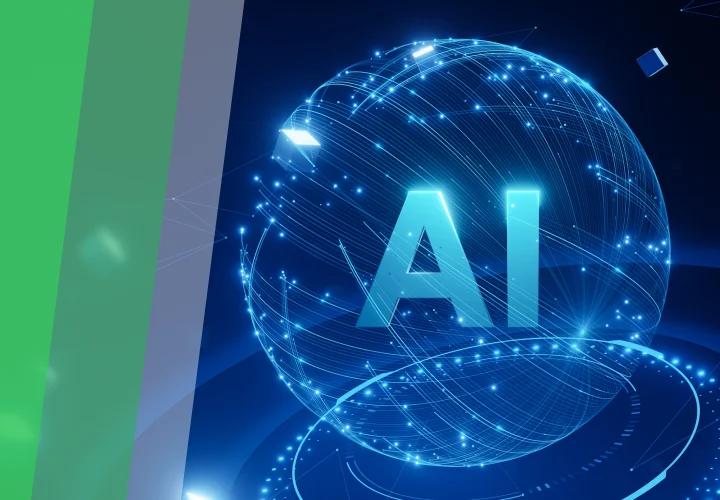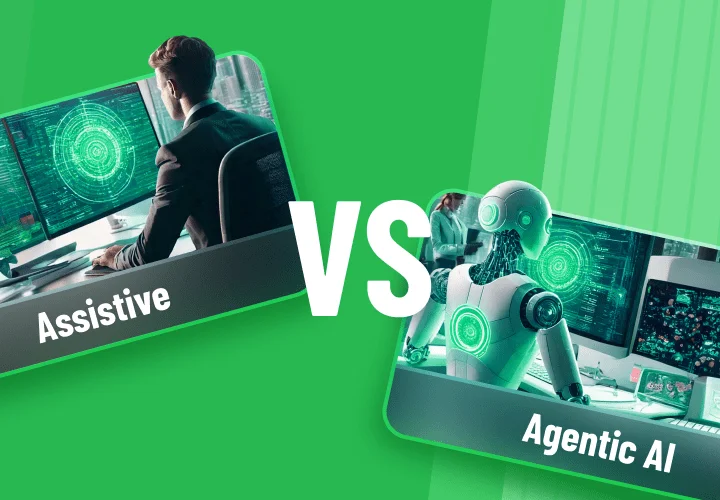Exploring Consumer Tech Trends for 2026: Insights & Predictions
Table of contents
- Trends in Consumer Technology That Shape 2026
- Artificial Intelligence: the driving force behind consumer tech
- AI in action: Ray-Ban Meta
- Personal and domestic robots: a revolution in everyday life
- Amazon Astro: a glimpse into the future of home robotics
- Extended reality & spatial computing: immersing into the future
- Spatial computing and luxury brands
- Health tech: revolutionizing personal well-being
- Gucci Oura: merging luxury and health monitoring
- 5G in consumer electronics: driving a new era of innovation
- IoT and smart homes: the connected living revolution
- Samsung's Family Hub
- Sustainability: a green future in consumer technology
- Fairphone
- Wrapping Up
Over the past few years, the world has undergone rapid transformations. As we look ahead, consumer technology trends continue to play a pivotal role in shaping our daily lives and future opportunities. When we talk about consumer technology, we mean any technology or device directly purchased by individuals for personal use - from smartphones and wearables to smart home devices and more.
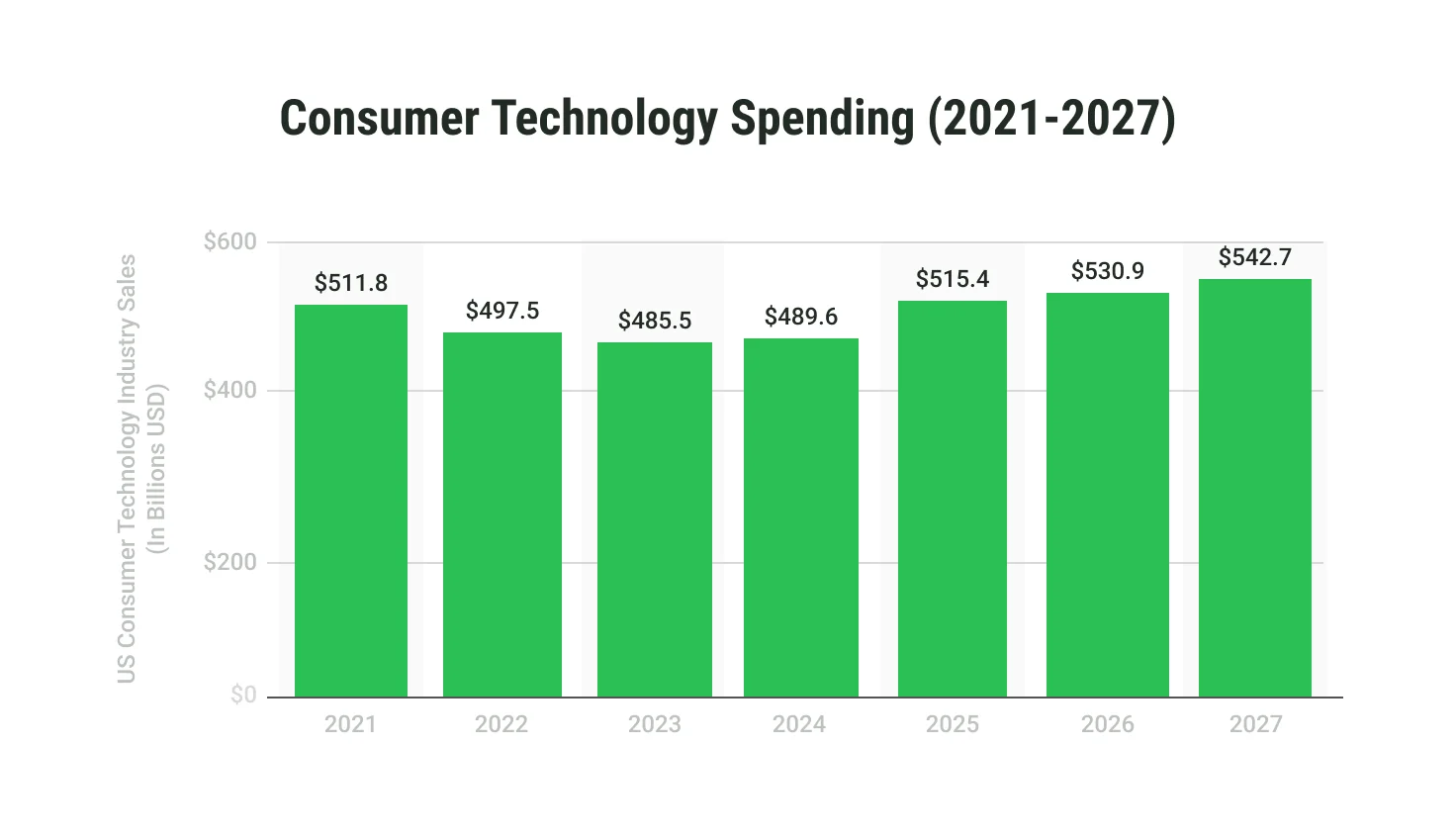
According to recent reports, consumer technology spending is on a significant rise, with projections showing it will grow to $542 billion by 2027, driven by a shift from "connected" devices to "autonomous" ones. This surge underscores the importance of staying informed about trends and redefining how we work, learn, and connect with friends and families. Artificial intelligence is no longer just a tool for professionals; it is the core operating system of our daily lives.
But AI is just one piece of the puzzle. What other technologies will define 2026? How can they be effectively implemented to future-proof your business? Join us as we explore the meaning and impact of consumer technology trends and envision the possibilities ahead.
Trends in Consumer Technology That Shape 2026
The world of consumer technology is evolving faster than ever, introducing innovations that are not just transforming industries but also redefining our everyday lives, work, and connections. From advancements in artificial intelligence to breakthroughs in wearable tech, the trends on the horizon promise to enhance our daily experiences in profound ways.
These trends are not just about creating new gadgets but about reshaping consumer expectations and fostering a deeper connection between brands and their audiences.
Let's explore the leading trends driving this revolution and their potential for consumers in 2026.
Artificial Intelligence: the driving force behind consumer tech
AI-based apps remain the most significant trend for 2026, but the focus has shifted to On-Device AI. It will revolutionize everything from shopping to interacting with devices. AI's ability to learn, adapt, and optimize has made it a cornerstone of innovation, promising unprecedented convenience and efficiency for consumers worldwide.
One of the most impactful applications of AI lies in hyper-personalization, where AI-driven tools analyze vast amounts of data in real-time to deliver tailored experiences. By identifying patterns in consumer behavior — such as browsing habits, purchase history, and even feedback — AI enables businesses to anticipate individual needs and provide personalized recommendations, offers, and content.
For example, streaming platforms can curate unique playlists, E-commerce sites can suggest products that perfectly match your preferences, and fitness apps can design bespoke workout routines based on your activity levels and goals. This enhances customer satisfaction and fosters long-term loyalty, making consumers feel seen and valued.
To achieve such precision, companies must harness data effectively, gathering insights from various sources, including demographics, online interactions, and transaction history. This data is the foundation for creating hyper-personalized interactions that resonate deeply with consumers. The result? A seamless, delightful customer experience that stands out in an increasingly competitive market.
Beyond personalization, AI is empowering businesses to hyper-connect with their customers. Omnichannel solutions, for instance, provide customer service agents with a unified platform to analyze data in real-time and offer instant solutions. Intelligent chatbots and virtual assistants engage consumers in personalized, real-time conversations, delivering immediate assistance while enhancing the overall user experience.
These tools streamline processes and create opportunities for businesses to build trust and strengthen relationships. By leveraging AI, companies can meet consumers wherever they are - whether on social media, email, or mobile apps - ensuring consistent and responsive service across all channels.
AI in action: Ray-Ban Meta
A notable example of AI's impact on consumer tech is Ray-Ban Meta, a collaboration between Ray-Ban and Meta. These innovative smart glasses combine style with cutting-edge AI-powered features, offering users hands-free access to information, immersive experiences, and personalized functionalities. Whether capturing moments seamlessly or receiving context-aware notifications, the Ray-Ban Meta exemplifies how AI can elevate everyday life.
As AI continues to evolve, its potential to shape the future of consumer technology is boundless. From hyper-personalization to connected ecosystems, this trend is setting new benchmarks for convenience, efficiency, and user engagement, making 2026 a year of remarkable innovation.
Personal and domestic robots: a revolution in everyday life
Personal and domestic robots are rapidly transforming how we manage our homes and daily routines, offering convenience, efficiency, and a glimpse into the future of smart living. These robots are no longer just novelties but practical tools designed to assist with various tasks, from cleaning and home security to companionship and caregiving. Their growing popularity is fueled by AI, robotics, and connectivity advancements, making these technologies more accessible and versatile than ever before.
According to recent reports, the home robot market is expanding at an unprecedented pace, valued at $8.55 billion. By 2029, it's projected to soar past $22 billion, reflecting strong consumer demand for innovative solutions that simplify life. This growth is driven by integrating intelligent features, such as voice recognition, machine learning, and the ability to adapt to user behaviors. Personal robots are no longer confined to vacuuming or mopping - they are evolving into multifunctional companions capable of performing various tasks and interacting naturally with their users.
Amazon Astro: a glimpse into the future of home robotics
Amazon Astro is a prime example of how personal robots push innovation's boundaries. This compact mobile robot is designed to serve as a home assistant and a security companion, combining advanced AI with a sleek, user-friendly design. With home monitoring, remote communication, and Alexa integration, Astro can navigate your home, check in on rooms, and even deliver items to specific locations.
Amazon Astro's ability to personalize interactions based on household needs sets it apart. For instance, it can send alerts if it detects unusual activity while you're away or remind you of important tasks through voice commands. As a representation of the rapid advancements in domestic robotics, Astro highlights the growing potential for robots to become indispensable members of the modern household.
As personal and domestic robots continue to evolve, they are set to redefine convenience and transform how we interact with technology at home, making them one of the most exciting consumer tech trends to watch in 2026.
Extended reality & spatial computing: immersing into the future
Extended reality (XR), encompassing augmented reality (AR), virtual reality (VR), and mixed reality (MR), along with spatial computing, is reshaping consumer experiences across industries. These technologies enable more immersive, interactive, and engaging ways for people to connect with digital content, transforming how we shop, learn, and entertain ourselves.
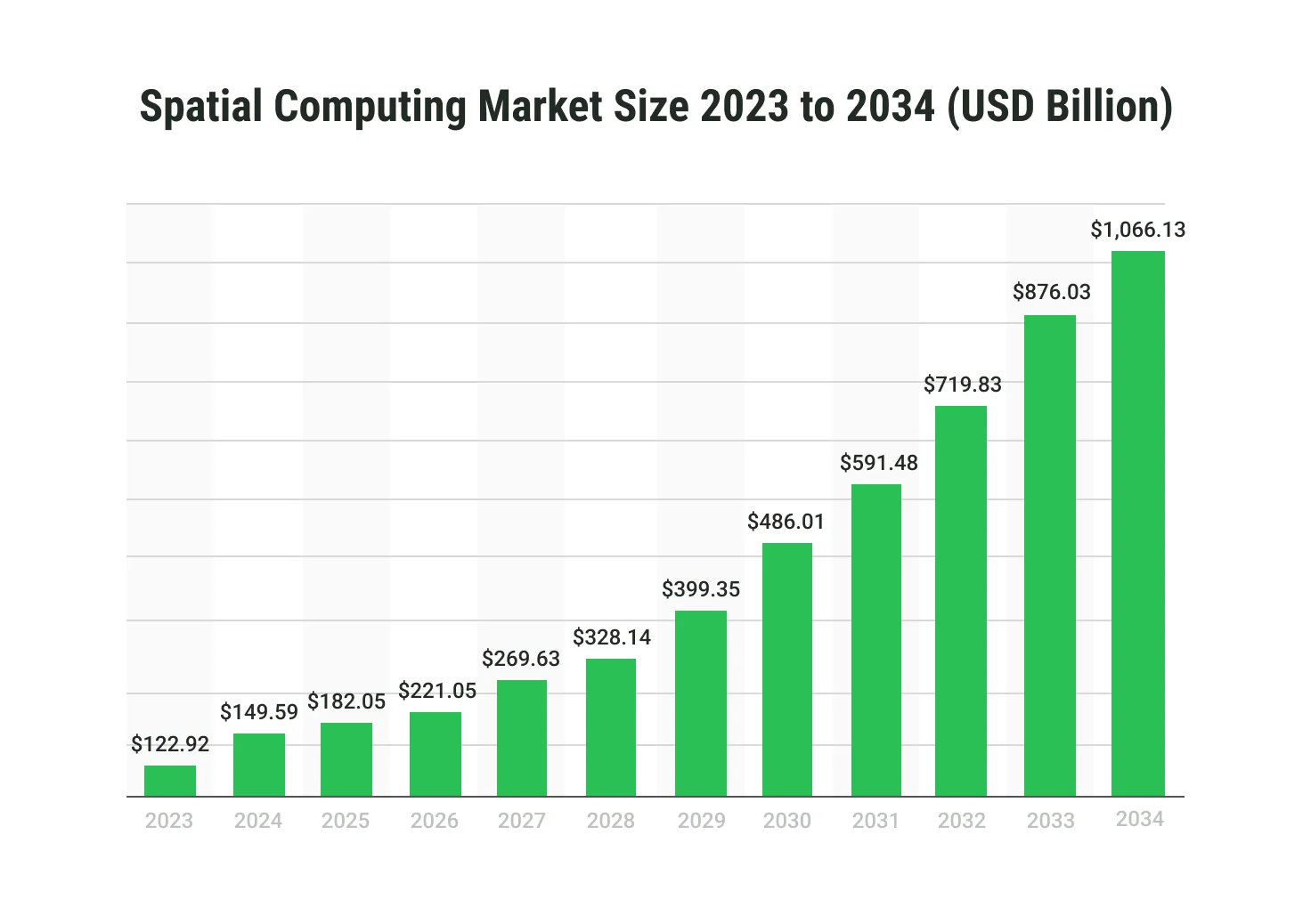
As shown in the chart above, the market for spatial computing is projected to grow from $122.92 billion in 2023 to a staggering $1,066.13 billion by 2034. This growth highlights the increasing demand for applications that blend the virtual and physical worlds. These applications offer consumers new ways to manage their everyday habits while driving the adoption of XR and spatial computing in personal and professional spaces.
Spatial computing and XR fundamentally alter consumer behavior by making interactions with products and services more intuitive and immersive. With spatial computing, consumers can engage with digital objects as if they were physical, enabling seamless interactions in retail, real estate, and education. For example, shoppers can visualize furniture in their homes using AR before purchasing, students can explore historical landmarks through VR, and professionals can collaborate on virtual 3D models in real time.
Extended reality also empowers consumers to make more informed decisions. By experiencing products or environments virtually, they can gain confidence in their choices, reducing buyer’s remorse and increasing satisfaction. This shift sets new expectations for businesses to deliver immersive, personalized experiences that align with modern consumer demands.
Spatial computing and luxury brands
Luxury brands leverage spatial computing to elevate customer experience and build deeper connections with clientele. For example, premium retailers are integrating AR into their stores, allowing customers to virtually try on clothing, jewelry, or watches before purchasing. Additionally, high-end automotive brands use VR showrooms to let potential buyers explore and customize vehicles in a virtual space.
This innovative approach creates a sense of exclusivity and sophistication and enhances convenience for consumers. By combining luxury with cutting-edge technology, spatial computing enables brands to stay ahead of the curve and redefine the essence of luxury in the digital age.
Health tech: revolutionizing personal well-being
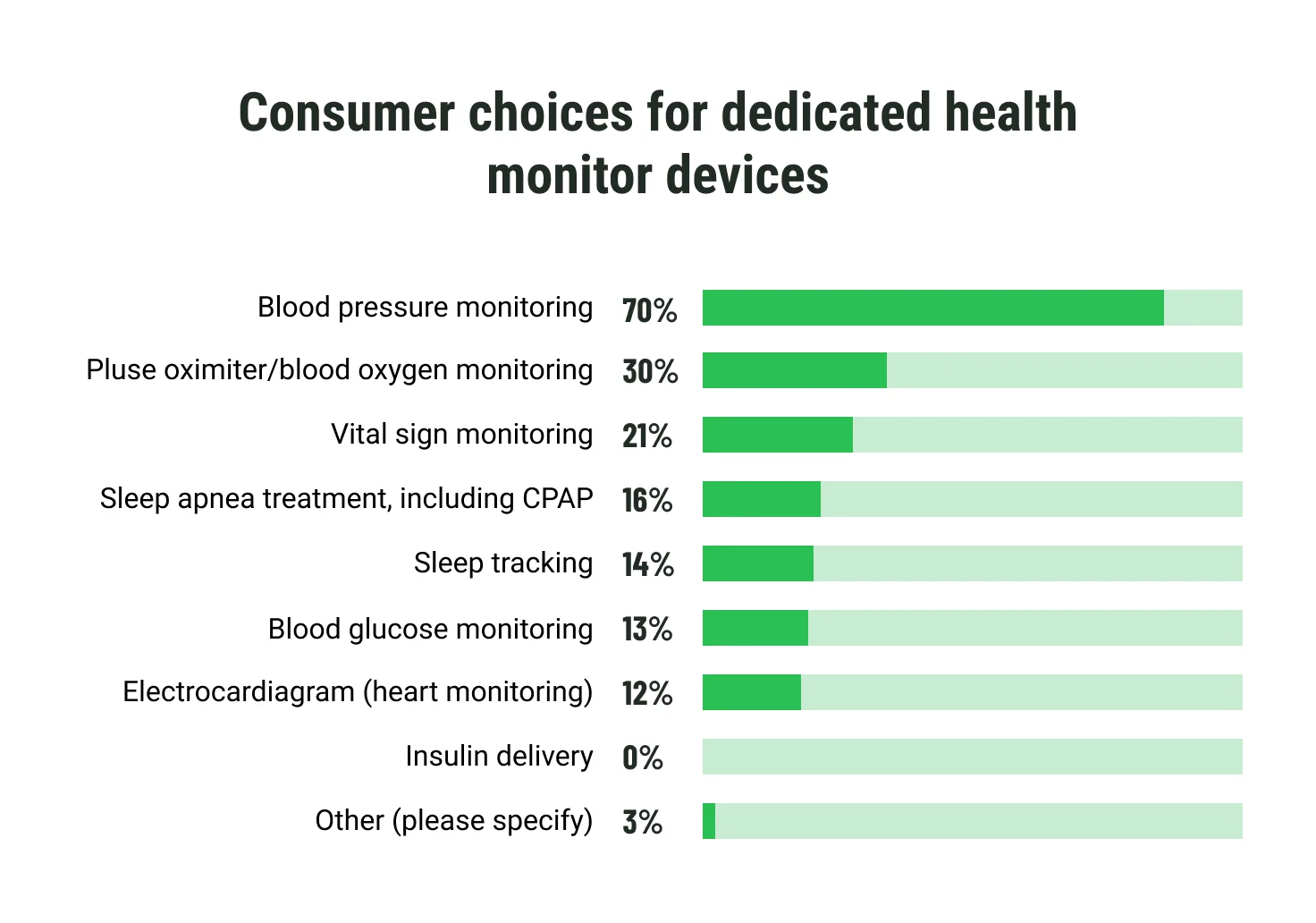
The health tech industry is witnessing unprecedented growth as consumers increasingly turn to technology to monitor, manage, and improve their well-being. According to recent data, blood pressure monitoring tops the list of functionalities in dedicated health devices, with a staggering 70% of users relying on them for this purpose. Other popular features include pulse oximetry (30%), vital sign monitoring (21%), and sleep apnea treatment (16%). These insights underscore a clear trend: people prioritize real-time insights into their health, using devices tailored to their specific needs.
The mHealth market is poised for explosive growth. Wearable devices, remote patient monitoring systems, and mobile apps are leading this surge, making healthcare more accessible and personalized than ever. For a deeper dive into how mobile technologies are shaping healthcare, another insightful article by Emerline explores the trends redefining this field, emphasizing how innovation is enhancing patient care globally.
Gucci Oura: merging luxury and health monitoring
An exciting example of health tech innovation is the Gucci x Oura collaboration, which combines cutting-edge health tracking with luxury design. The Oura Ring, already renowned for its ability to monitor sleep, activity levels, and heart rate, now comes wrapped in Gucci's iconic style. This partnership demonstrates how health tech is about functionality and aesthetics, offering consumers a way to prioritize wellness without compromising style.
As health tech continues to evolve, the fusion of technology, design, and data-driven insights ensures it remains a cornerstone of consumer technology trends, empowering individuals to take charge of their health like never before.
5G in consumer electronics: driving a new era of innovation
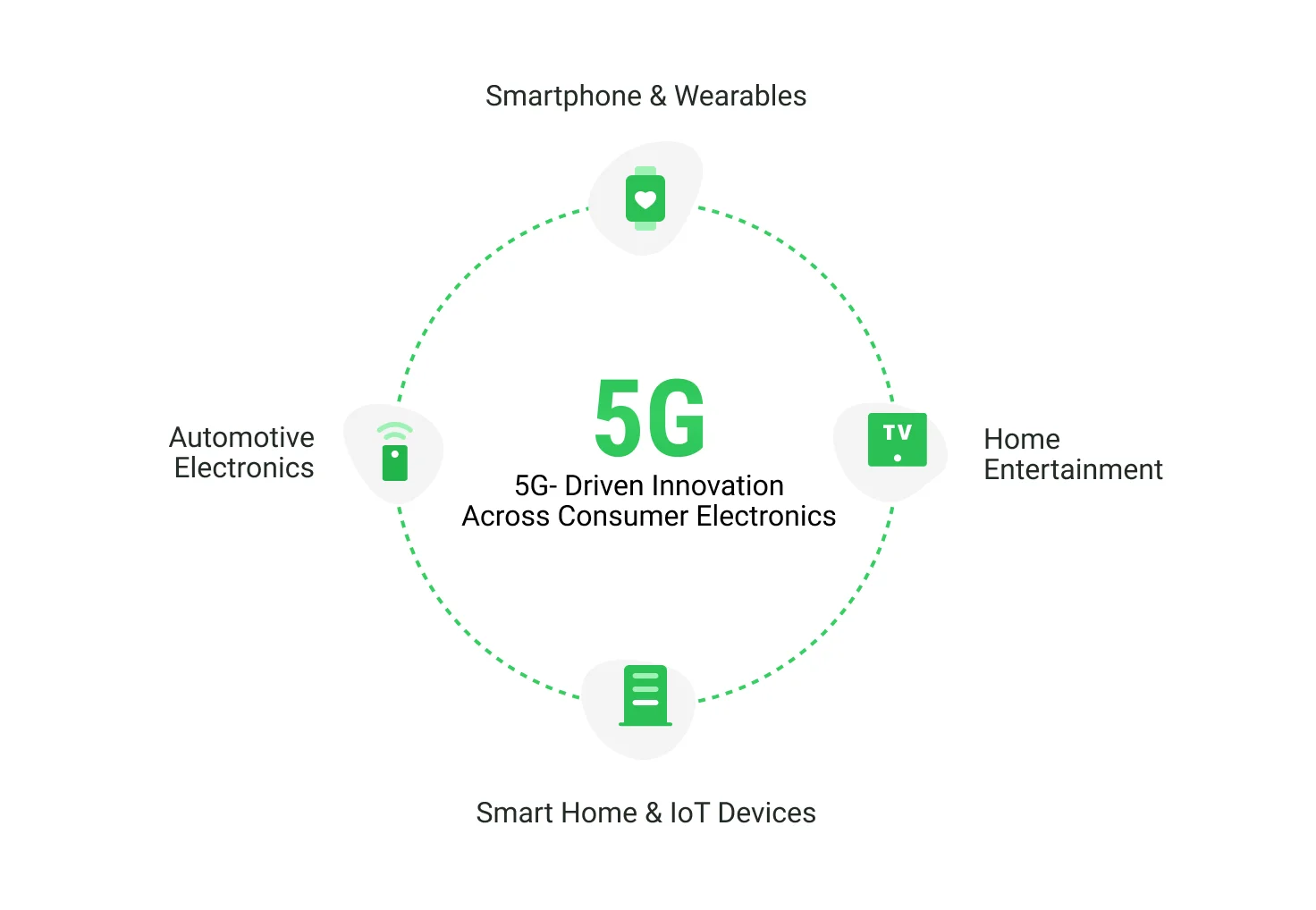
The rollout of 5G technology is transforming the consumer electronics landscape, enabling faster speeds, lower latency, and seamless connectivity. By enhancing devices' performance and capabilities, 5G is unlocking new possibilities for innovation across various categories, revolutionizing how consumers interact with technology.
- Smartphones & wearables
In the realm of smartphones, 5G has become a game-changer. With faster download and upload speeds, users can stream high-definition content, participate in lag-free video calls, and enjoy cloud gaming experiences that were once unimaginable on mobile devices. Beyond smartphones, wearables like smartwatches and fitness trackers also leverage 5G to provide real-time health monitoring, GPS tracking, and enhanced integration with other devices, ensuring a seamless and connected user experience.
- Home entertainment
Introducing 5G in home entertainment elevates how consumers enjoy digital content. Smart TVs and streaming devices now deliver ultra-high-definition 8K video streaming without buffering, while virtual reality (VR) headsets powered by 5G create more immersive experiences, bringing gaming and interactive media to life. With 5G, home entertainment is no longer bound by bandwidth limitations, allowing for smoother and more dynamic content consumption.
- Automotive electronics
In automotive electronics, 5G is fueling advancements in connected cars, enabling real-time navigation, over-the-air updates, and autonomous driving capabilities. Drivers and passengers benefit from enhanced infotainment systems, seamless connectivity for on-the-go streaming, and improved vehicle safety through real-time data sharing between vehicles and infrastructure. The automotive industry is leveraging 5G to create smarter, safer, and more efficient cars.
- Smart homes and IoT devices
5G is the backbone of smart homes and IoT ecosystems, enabling devices like smart thermostats, security cameras, and voice assistants to operate more efficiently. With 5G, these devices can communicate in real-time, respond faster to user commands, and provide more accurate data insights. 5G-powered IoT devices enhance consumer convenience and control, from managing energy consumption to ensuring home security.
As 5G technology expands, its impact on consumer electronics will only grow. It will drive innovation across industries and reshape our lives, work, and play in a hyper-connected world.
IoT and smart homes: the connected living revolution
The Internet of Things (IoT) has transformed how we interact with our homes, bringing the concept of smart living to the forefront of consumer technology. IoT-enabled smart homes leverage interconnected devices and systems to create a seamless, automated, highly personalized living experience. Smart homes empower consumers to control their living environments by improving energy efficiency, security, and convenience.
One of the key benefits of smart homes is automation. Consumers can program smart lighting, thermostats, and appliances to operate based on their daily routines, optimizing energy usage and reducing costs. Security is another significant advantage; smart cameras, doorbells, and motion sensors offer real-time monitoring and alerts, giving homeowners peace of mind. IoT devices simplify everyday tasks, such as voice-controlled assistants handling reminders, grocery lists, or even managing entertainment systems. The result is a home that adapts to the user's needs, enhancing comfort and efficiency.
Samsung's Family Hub
A perfect example of IoT in action is Samsung's Family Hub technology. This advanced smart refrigerator connects seamlessly to other IoT devices in the home, acting as a central hub for family organization. Equipped with cameras, touchscreens, and AI-powered features, the Family Hub allows users to remotely check their fridge's contents, create shopping lists, and even order groceries online. Beyond kitchen convenience, it integrates with other smart devices, enabling users to control lighting, security cameras, and more — all from a single interface. Samsung's Family Hub demonstrates how IoT transforms household appliances into essential components of connected living.
Sustainability: a green future in consumer technology
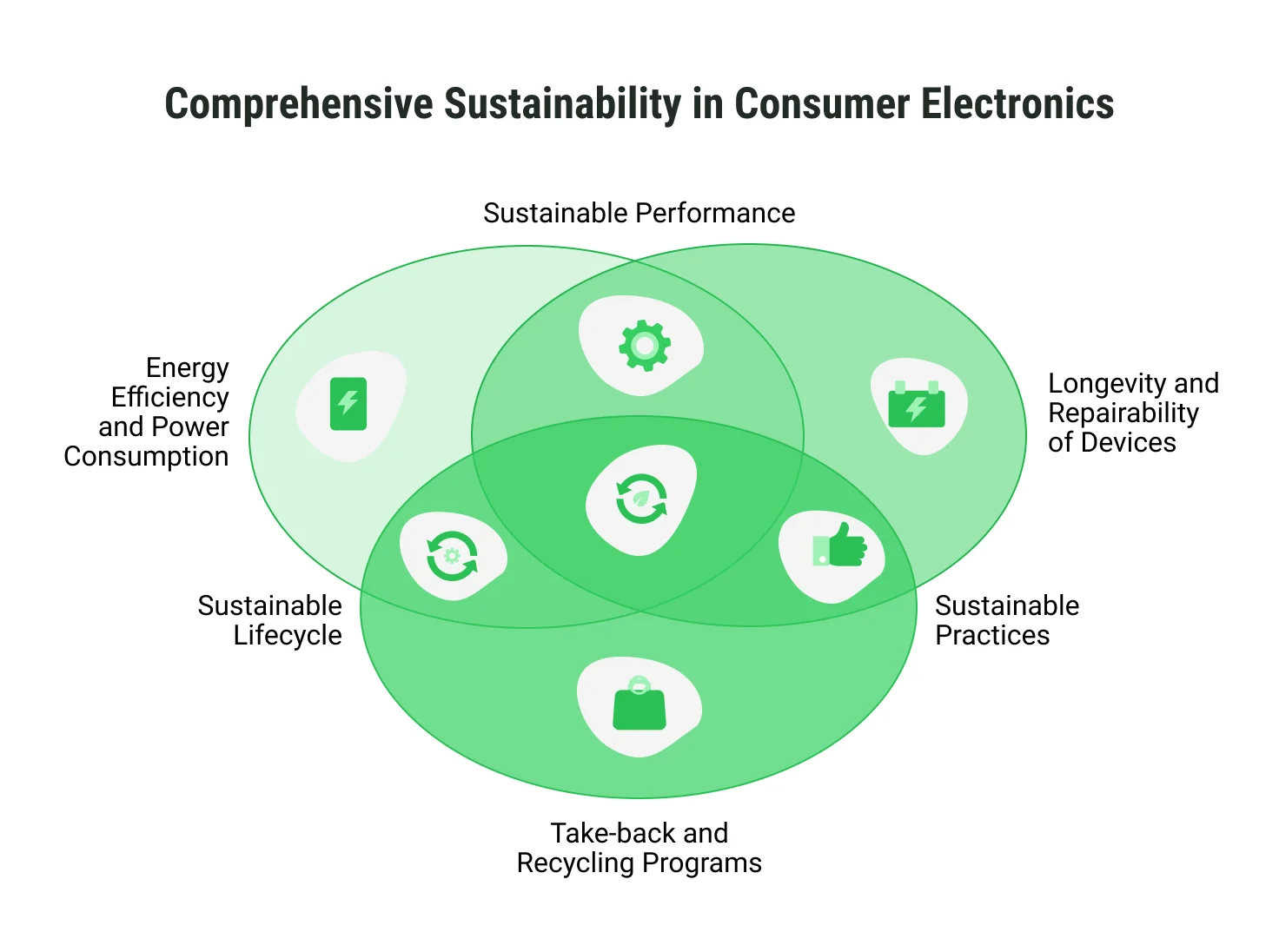
Sustainability has emerged as a pivotal trend in consumer technology, reflecting a growing demand for eco-friendly and socially responsible products. Consumers are increasingly prioritizing devices designed to minimize environmental impact, reduce waste, and promote ethical sourcing of materials. This shift drives companies to innovate and align their practices with sustainability goals, creating technology that serves users and contributes to the planet's well-being.
Sustainable tech offers several benefits to consumers. Thanks to modular designs and repairability, eco-friendly products often have longer lifespans, reducing the need for frequent replacements. Renewable energy integration, such as solar-powered devices, allows users to minimize energy consumption and lower utility bills. Moreover, many companies are adopting circular economy principles, where old devices can be recycled or refurbished to reduce e-waste. This approach empowers consumers to make conscious choices that align with their values while enjoying innovative products.
Fairphone
Fairphone stands as a shining example of sustainability in consumer electronics. This modular smartphone is designed with repairability in mind, allowing users to easily replace components like the battery, camera, or screen, significantly extending its lifespan. Fairphone also prioritizes ethical material sourcing, ensuring the use of conflict-free minerals and recycled materials. Furthermore, the company is committed to fair labor practices in its supply chain, promoting social sustainability alongside environmental responsibility. By choosing Fairphone, consumers can embrace cutting-edge technology while supporting a more sustainable future.
Wrapping Up
The landscape of consumer technology is evolving at an unprecedented pace, driven by groundbreaking innovations and shifting consumer priorities. From the rise of personal and domestic robots enhancing daily convenience to the transformative potential of 5G and IoT in creating connected ecosystems, these trends are reshaping how we interact with technology and the world around us. The extended reality, spatial computing, and health tech are opening new dimensions in user experiences, bridging gaps between the physical and digital realms while improving overall well-being.
Updated on Dec 24, 2025

